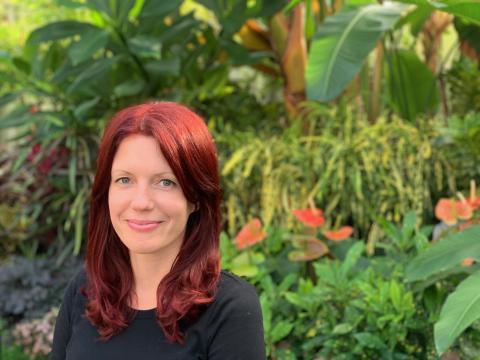
Professor Kristen Thomasen is a leading Canadian expert in robotics law and policy, specializing in drone regulation and the privacy impacts of robotic technologies. She teaches Robotics Law & Policy and Tort Law.
What drew you to teaching and academia?
I've always loved teaching, since I was a teen babysitting and math-tutoring, so I'm incredibly grateful to be able to pursue a career in teaching and research. What really drew me to teaching and academia were several of the teachers I had throughout my life who took the time to mentor and cultivate curiosity in their students. These teachers inspired me to want to try to do the same. Meanwhile, I've learned so much about the law through teaching it, it's been transformative. One of the many things that drew me to academia specifically was the opportunity to think critically about technologies that don't yet exist (or aren't widely used), which is where a lot of my research has been focused. When I was first becoming interested in the regulation of robot-systems, there wasn't a lot of legal practice in this area. That has definitely changed since!
How did you first become interested in law and robotics?
I entered law school interested in privacy and human rights, and like a lot of students, my interests began to grow from there. This happened for me after I started working for Dr. Ian Kerr as a research assistant. He was one of the early researchers thinking about how law should regulate automated technologies, like some of the software-based systems that we see in wider use today. I worked on a few research projects dealing with different robotic and automated technologies and I was hooked. The way that dynamics of power, and even law itself, are embedded and hidden in technologies that can increasingly work with little human input and oversight terrifies me, to be honest. I think there is a lot of potential to enhance human flourishing with some automated technologies, but we have to be careful about how we approach the delegation of decision-making to machines. To be frank, on the whole right now that care just isn't consistently there. I think law and regulation can play one role in a much larger conversation about how to approach automation as a society; a conversation that is especially urgent if we really want to be a society that values and promotes equality and justice.
What research topics are currently of particular importance to you that you would like to highlight?
Automated systems are affecting people's daily lives in a huge range of sometimes obvious and sometimes subtle ways. I'm really interested in (and nervous about) how robotic technologies will change urban public spaces. I think there is potential for some important positive uses of automation, for example, in making the built environment more accessible, and for protecting the environment from negative human impacts. But there's also a real risk of privatizing shared spaces, prioritizing commercial technologies over people, furthering colonial projects under the guise of innovation, and marginalizing people and communities from spaces that have important shared and social values. My research focuses on some of these challenges, especially in relation to privacy and surveillance. But it's just one small part of a much broader set of questions, that don't always get prioritized when tech is driven by a 'move fast and break things' mindset. Fortunately, a lot of thoughtful people are working on highlighting and addressing these challenges.
Last Updated: Jan 2021